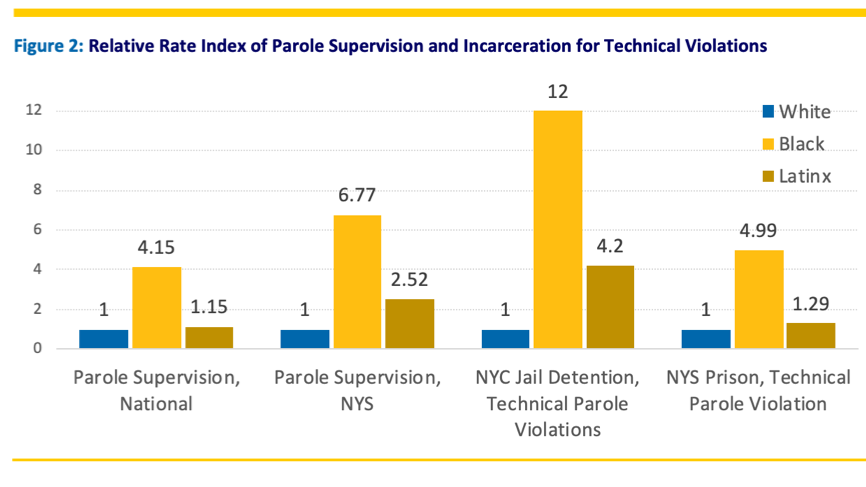March 12, 2020
The scope and conditions of parole supervision in New York have profound impacts for people serving supervision sentences. New York sends more people back to prison for non-criminal, technical parole violations than any state except Illinois, and people detained for alleged non-criminal parole rule violations comprise the only population growing in New York City jails, threatening plans to close the notorious Rikers Island jails complex.
Racial Inequities in New York Parole Supervision
This report highlights ways in which these harmful impacts disproportionately fall on Black and brown communities. The authors find that Black and Latinx people are significantly more likely than white people to be under supervision, to be jailed pending a violation hearing, and to be incarcerated in New York State prisons for a parole violation. The report also summarizes existing research on disparities in parole supervision practices nationally.

The authors recommend that New York address points of racial and ethnic disparity through policy change – namely, by shortening parole supervision periods, curbing the use of jail detention for people awaiting adjudication of alleged parole violations, and limiting the possibility of incarceration for technical violations. They conclude that there is significant existing momentum toward reform in these areas, and that New York should take legislative action to reform parole practices while there is a window of opportunity to do so.
Executive summary
“Technical parole violations fall most heavily on people of color, their families and communities,” says Vincent Schiraldi, report co-author, co-director of the Columbia Justice Lab and former New York City Probation Commissioner. “The alarming racial disparities in our report should serve as a clarion call for state policymakers to act this year to redress this unacceptable situation.”
“The risk of reincarceration for a violation threatens not only the person under parole supervision, but also their family,” says report co-author and director of the Justice Lab’s Probation and Parole Reform Project Kendra Bradner. “A father may be unable to accept a well-paying night job or take a sick child to the emergency room if it conflicts with his parole curfew. A mother may face homelessness because parole terms do not permit her to live with family members who have a criminal record or who live in public housing. These situations further complicate an already-difficult process of reentering society, and exacerbate systemic racial inequities.”
Leaders weigh in on Racial Inequities in New York Parole Supervision:
Vanita Gupta, President and CEO, Leadership Conference on Civil and Human Rights: “We commend the Columbia Justice Lab for releasing this important report and placing a spotlight on an ever-growing problem in our nation – the revolving door of incarceration through probation, or parole, supervision and the grossly inequitable treatment of black and brown people within it. The problems with community supervision in New York and the disparities associated with it are but a snapshot of the crises faced by many jurisdictions throughout the country. It is past time that we transform the probation and parole systems nationally and end the cycle of mass incarceration and the inequitable treatment of people of color. Studies like this one provide the data needed to bring about change to this flawed system that is largely ungoverned by law and policy.”
New York State Bar Association President Henry M. Greenberg: “New York State and its municipalities spent nearly $600 million last year reincarcerating people on technical parole violations such as missing curfew. The impact of reincarceration falls disproportionately on people of color. Given the Columbia University report, the New York State Bar Association renews its call to drastically reduce the use of reincarceration for such minor transgressions.”
Soffiyah Elijah, Executive Director, Alliance of Families for Justice: "Families form the fiber of any community and when the families are in crisis, the community is in crisis. Poor Black and Brown communities have been devastated by mass incarceration and racially biased parole practices, and the collateral consequences of that devastation are immeasurable. Reincarcerating people for technical violations of parole is hugely disruptive to the reentry process and harms families who are working to support their loved ones. This report should prompt lawmakers to take action immediately."
Click to go back to homepage.